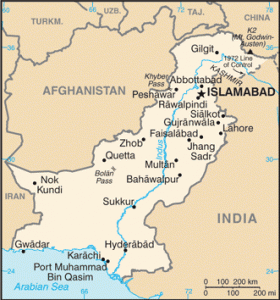Carnage in Pakistan’s Tribal Region Continues: US Drones Kill 21 Thurs., Suicide Bomber Kills 26 Fri.
Despite some prospects on negotiations toward peace looking better in Afghanistan and Pakistan, the carnage in Pakistan’s tribal areas continues at a rapid pace. Two separate US drone attacks in North Waziristan on Thursday killed 21 people and a suspected suicide bomber killed 26 in the Kurram Agency region on Friday.
According to Dawn, the first drone attack killed six:
According to sources, six people were killed and two others injured when two missiles slammed into a compound in the village of Spilga near Miramshah. The identities of the persons who died could not be ascertained.
The second attack was just a few hours later:
Hours later, another drone attacked a moving vehicle on the Zekerkhel-Khaisur road in Mirali tehsil.
Official sources said 15 members of a militant group were killed. Their bodies were charred.
The article noted that “unmanned planes” continued to fly around the area as local rescuers came to the scene.
There were reports that those killed in the second attack were Uzbek.
As for those killed in the first attack:
Those who died in the first attack belonged to Badar Mansoor and the Haqqani network, loyal to the Afghan Taliban, another official said. Last Thursday, officials said Mansoor, described as the “de facto leader of Al Qaeda in Pakistan” had been killed in a drone strike in North Waziristan.
There appears to be a Haqqani network tie to the suspected suicide bomb attack earlier today in Kurram Agency:
The bomber struck outside the mosque in a busy market in Parachinar, the main town in Kurram, after Friday prayers, in the latest attack by Sunni militants against minority Shias.
/snip/
Fazal Saeed, leader of a breakaway faction of the Pakistani Taliban, claimed responsibility for the attack.
“We have targeted the Shia community of Parachinar because they were involved in activities against us,” he told Reuters by telephone from an undisclosed location.
/snip/
He is said to have close ties with the Haqqani militant group, one of the most feared factions of the Afghan Taliban.
The Express Tribune coverage of this attack states that there were 26 deaths and also raises questions of whether it was a suicide bomber or another type of blast, but the Dawn article appears to be at least two hours more recent than the Express Tribune article. A Reuters article just a few minutes old as of this writing also placed the death toll in the bombing at 26 and said that it was the work of a suicide bomber.
It’s very difficult to see how either the US or the Taliban can be engaged in peace negotiations while at the same time killing large numbers of people. For both sets of killings, it appears there are more than enough survivors in the area to take up the cause of those killed, perpetuating the cycle of killing.


